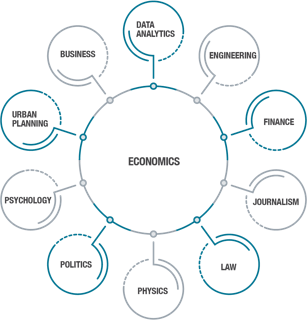Course Structure
What is Economics?
Economics is a science concerned with human behaviour and it intersects many areas of study and application such as Business, Data Analytics, Engineering, Finance, Journalism, Law, Physics, Politics, Psychology, Sociology and Urban Planning.
Economics is about solving problems and improving people’s lives. In this respect it is very relevant to tomorrow’s world and it opens broad career opportunities: from policy making to consulting and running your own company.
Studying economics also provides a hedge in our digital revolution era. With the radically improved computation infrastructure and the availability of big data, the discipline has changed. A core part of the training of an economist focuses on the ability to use these data. Such a skill will help companies and decision makers in making better decisions.

Curriculum for students admitted AY2019-20 onwards
The Bachelor of Science (Economics) programme comprises three key sections: (1) the Core Curriculum, which helps students cultivate a stable intellectual core, cutting across disciplines; (2) the Major Requirements, which help students develop depth in their chosen discipline of study; and (3) the Free Electives, which afford students choice for flexible self-directed learning, towards greater disciplinary depth or multidisciplinary breadth.
Core Curriculum
The first pillar, Capabilities, is about imparting to students the necessary skills to dexterously operate in an increasingly digitised and data-driven working environment. These skills will be imparted in courses from five baskets.
Managing (2 Course Units)
Choose two from:
- Accounting for Entrepreneurs
- Business, Government and Society
- Capital Markets in China
- Leadership and Team Building
- Management Communication
- Spreadsheet Modelling and Analytics
Modes of Thinking (1 Course Unit)
Choose one from:
- Critical Thinking in the Real World
- Computational Thinking
- Managing in a Volatile, Uncertain, Complex and Ambiguous Context
Numeracy (1 Course Unit)
- Calculus
Writing and Reasoning (1 Course Unit)
- Programme in Writing and Reasoning
Internship (1 Course Unit)
The Communities pillar aims to help students understand the economic, technological, and cultural systems that structure our interactions with our communities. It comprises four baskets:
Economics and Society (1 Course Unit)
Technology and Society (1 Course Unit)
Choose one from:
- Can Machines Think? AI in History, Philosophy, and Fiction
- Climate Change: Global and Local Solutions
- Climate, History and Society
- Digital Cultures
- Innovations for Asia’s Smart Cities
- Science, Environment and Empire
- Science and Technology Studies: Where Science meets Society
- Technology and World Change
- Technological Innovations Enhancing Urban Sustainability
- Technological Solutions to Urban Challenges
Cultures of the Modern World (1 Course Unit)
Choose one from:
- Constitutions, Cultures, and Context
- Contemporary South Asian Societies
- Film in Southeast Asia
- Global and Transnational Sociology
- Jurisprudence: Modern and Critical Theories of Law
- Politics of South East Asia
- Singapore: Imagining The Next Fifty Years
- Sustainable Cities
- Understanding China’s Economics Miracles
- Urban Cultures
- Foreign Languages, such as Bahasa Melayu, French, Italian, Japanese, Korean, Mandarin, Spanish, Thai
Community Service (1 Course Unit)
The Civilisations pillar immerses students in the fundamental debates that cut across time and space, preparing them to engage in critical dialogue between multiple and competing traditions of thought and problem-solving.
Ethics and Social/Corporate Responsibility (1 Course Unit)
- Ethics and Corporate Responsibility
Big Questions (1 Course Unit)
Global Exposure
Economics Core and Electives
The Economics Core lays a broad foundation for the study of economics.
Students are required to complete the following courses:
- Introduction to Statistical Theory
- Mathematics for Economics
- Microeconomics 1
- Microeconomics 2
- Macroeconomics 1
- Macroeconomics 2
- Introduction to Econometrics
- Economic Development in Asia
Students are also required to complete one of the following options:
- International Economics; or
- International Trade and International Macroeconomics
Economics Electives provide students with specialised knowledge in various fields of economics. A total of 6 course units must be completed if students read International Economics, or 5 course units if they read International Trade and International Macroeconomics.
The set of Economics Electives is a rich menu of courses offering a wide range of topics to choose from. Some examples are
- Advanced Macroeconomics
- Advanced Microeconomics
- Data Science with R
- Development Economics
- Economic Forecasting
- Economics of Ageing
- Family and the Society: Economic Theories and Practices
- Game Theory
- Health Economics
- Healthcare Management
- Industrial Organisation
- Intermediate Econometrics
- Introductory Data Analytics in Healthcare
- Labour Economics
- Macroeconomics of Income Distribution
- Public Sector Economics
- Real Estate Economics
- Statistical Inference for Data Science
- Statistical Learning with R
- Strategic Thinking
- Urban Economics and Policy
A total of 9 course units must be completed. Free Electives encourage students to take any courses to broaden their knowledge in fields beyond their primary major.
Students may take any SMU course (including Economics Electives) to fulfil this component.
Additional Graduation Requirements
The Digital Technology/ Data Analytics graduation requirement acknowledges the pivotal role that digital technology and data analytics play in today's workplace. By fulfilling this graduation requirement, students will acquire essential skills and knowledge relevant in the digital age.
Sustainability is a pressing global concern. The Sustainability graduation requirement will equip students with an intermediate understanding of sustainability issues, contributing to a more sustainable future.
Singapore is a vibrate global hub and Asia is a region of immense significance in today's global economy. The Singapore and Asia Studies graduation requirement ensures that students gain a strong understanding of the dynamics of Singapore and the Asia region.
Global traction and understanding underpins success in careers in today's globally connected environment. To have global exposure from the vantage of a University education is invaluable for international networking and global vision; it also opens doors to bigger opportunities.